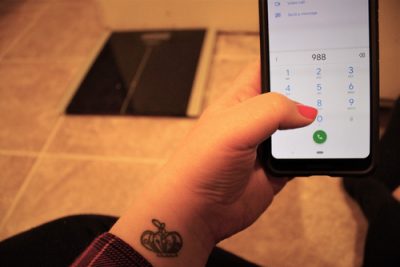
Crisis Response
An effective crisis services continuum, with customizations for adult and child/family populations, provides all individuals in crisis a clear pathway for accessing care and options for how to best meet their behavioral health needs. Innovations Institute works collaboratively with state and local government as they develop best practice care pathways to provide alternatives to emergency department and law enforcement responses and address the issues of safety, choice, and personal freedom. With our expertise in addressing the needs of children, youth, young adults, and their families, our work with public systems focuses on the Mobile Response and Stabilization Services (MRSS) model as an evidence-based customization to best meet the needs of this population.
For many years individuals experiencing behavioral health crises were advised to go to hospital emergency departments, or those observing the crisis to dial 911 resulting in a law enforcement response. Overreliance on the emergency department or law enforcement as the first points of contact for individuals with or at risk for serious mental illness and serious emotional disturbance often results in delayed treatment; exposure to additional trauma, injury, and death; and highlights the need to expand and enhance the behavioral health crisis service system. Our work focuses on these enhancements to achieve the best possible outcomes for people experiencing behavioral health crises, and their families.
Mobile Response & Stabilization Services
A Workforce Development Model for Addressing the Needs of Children, Youth, Young Adults & their Families in Crisis
Learn more about the MRSS model
If you or someone you know is experiencing a behavioral health crisis or needs immediate emotional support you can call or text 988 to reach the national 988 Suicide and Crisis Lifeline. Counselors are available 24 hours a day, every day.
National Mobile Response & Stabilization Services Work
 Innovations Institute is a national leader in the planning, development, and implementation of MRSS, currently providing technical assistance on MRSS design and implementation, including 988 compliance and coordination, to more than 20 states and communities.
Innovations Institute is a national leader in the planning, development, and implementation of MRSS, currently providing technical assistance on MRSS design and implementation, including 988 compliance and coordination, to more than 20 states and communities.
Mobile Response and Stabilization Services (MRSS) are community-based programs designed to provide immediate assistance and support to families experiencing crises related to their children's behavioral health issues. MRSS is part of larger state health reform initiatives and a necessary component of a robust and comprehensive system design. It is comprised of three service components:
- Someone to Contact—the access points for those experiencing a crisis and their caregivers
- Someone to Respond—mobile units that respond to crises in homes
- System to Support—stabilization services for those who need them
Experience & Partners
 Through the work of our National Technical Assistance Network for Children’s Behavioral Health (TA Network), Innovations developed and hosted six peer policy academies focused on MRSS with 27 states and territories. We created a resource bank on MRSS and issued publications focused on the cost effectiveness of MRSS and essential implementation best practices.
Through the work of our National Technical Assistance Network for Children’s Behavioral Health (TA Network), Innovations developed and hosted six peer policy academies focused on MRSS with 27 states and territories. We created a resource bank on MRSS and issued publications focused on the cost effectiveness of MRSS and essential implementation best practices.
During 2021 and 2022, SAMHSA engaged Innovations to convene a national expert panel focused on the development of a crisis continuum customized to meet the needs of children, youth, young adults, and their families. As part of this work, Innovations facilitated listening sessions with SAMHSA grantees and stakeholder groups including family and youth/young adult leaders and National Association of State Mental Health Program Directors (NASMHPD)’s Children, Youth and Families Division state leadership. Through NASMHPD’s SAMHSA-funded Technical Assistance Coalition and Transformation Transfer Initiative, Innovations provided individualized MRSS consultation to 16 states and territories, and developed, hosted, and provided subject matter expertise for the 2022-2023 MRSS Learning Community (recordings at right). With NASMHPD, the Child Health and Development Institute, and Social Current, Innovations launched the two-year 2022-2024 MRSS Quality Learning Collaborative, an in-depth learning opportunity designed for selected states to support MRSS best practice design, installation, and quality improvement. During the spring of 2023, we partnered with Youth Move National to develop a webinar series on collaborating with youth and young adults in the creation of effective crisis response systems: Designing with Youth-Strategies for Building Crisis Response Systems.
Our Publications
- MRSS Best Practice Design Table
- Services in Support of Community Living for Youth with Serious Behavioral Health Challenges: Mobile Crisis Response and Stabilization Services
- Making the Case for a Comprehensive Children's Crisis Continuum of Care
- A Safe Place to Be: Crisis Stabilization Services and Other Supports for Children and Youth
- Mobile Response for Children, Youth & Families: Best Practice Data Elements & Quality Improvement Approaches
- Mobile Response & Stabilization Services National Best Practices
- MRSS Guide for Leaders
Online Learning Resources
- Orientation to Mobile Response & Stabilization Services: A Critical Component in Modern Systems Design
- Mobile Response & Stabilization Services Learning Community Recorded Online Courses
- Mobile Response & Stabilization Services and Child Serving Public Systems
- Designing with Youth: Strategies for Building Crisis Response Systems